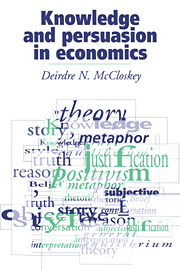Book contents
- Frontmatter
- Contents
- List of figures and tables
- Preface
- Acknowledgments
- Part I Exordium
- Part II Narration
- Part III Division
- 5 The Science word in economics
- 6 Three ways of reading economics to criticize itself
- 7 Popper and Lakatos: thin ways of reading economics
- 8 Thick readings: ethics, economics, sociology, and rhetoric
- Part IV Proof
- Part V Refutation
- Part VI Peroration
- List of works cited
- Index
7 - Popper and Lakatos: thin ways of reading economics
Published online by Cambridge University Press: 01 February 2010
- Frontmatter
- Contents
- List of figures and tables
- Preface
- Acknowledgments
- Part I Exordium
- Part II Narration
- Part III Division
- 5 The Science word in economics
- 6 Three ways of reading economics to criticize itself
- 7 Popper and Lakatos: thin ways of reading economics
- 8 Thick readings: ethics, economics, sociology, and rhetoric
- Part IV Proof
- Part V Refutation
- Part VI Peroration
- List of works cited
- Index
Summary
The outsider makes the same complaint about philosophers as he does about economists, saying, “These writers thin down the question so.” And so they both do. The economist thins the question of the good society right down to matters of price and marginal cost. The philosopher thins the good argument right down to matters of modus tollens and infinite regress. Precision comes from the conversational thinness, as does academic employment and other good. But even after such achievements we should not be surprised if outsiders want to get back to the main and fatter point.
Consider the favorite philosopher of economic Methodologists, Karl Popper. He is the favorite among scientists, too, because he flatters the scientists and they return the favor. Science in Popper's view is filled with romantic heroes falsifying the conventional view. The trouble with using Karl Popper's thinking for a history or methodology or criticism of economic thought is not mainly some flaw in its technique, though the philosopher Daniel Hausman among others has made the pervasiveness of the flaw clear (Hausman 1988; cf. Klant 1984). The main problem, even in this richest of rationalist philosophies, is its thinness. Rich as Popper's thinking is, supplemented by Lakatos, elaborated and applied with wonderful ingenuity by their followers during the 1970s and 1980s, it looks thin beside the actual conversation of science.
- Type
- Chapter
- Information
- Knowledge and Persuasion in Economics , pp. 85 - 93Publisher: Cambridge University PressPrint publication year: 1994



